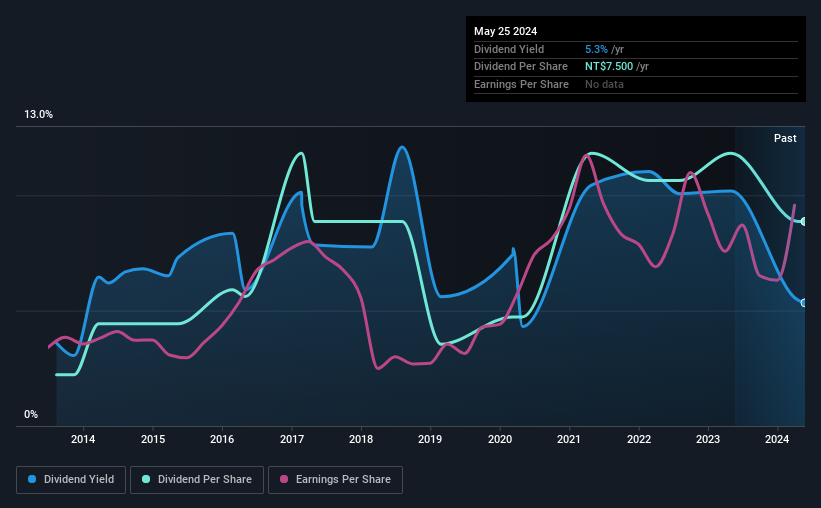Nishoku Technology's (TWSE:3679) Shareholders Will Receive A Smaller Dividend Than Last Year

Nishoku Technology Inc. (TWSE:3679) is reducing its dividend from last year's comparable payment to NT$7.50 on the 12th of July. However, the dividend yield of 5.3% is still a decent boost to shareholder returns.
See our latest analysis for Nishoku Technology
Nishoku Technology's Earnings Easily Cover The Distributions
If the payments aren't sustainable, a high yield for a few years won't matter that much. Prior to this announcement, the company was paying out 97% of what it was earning and 75% of cash flows. While the cash payout ratio isn't necessarily a cause for concern, the company is probably focusing more on returning cash to shareholders than growing the business.
If the trend of the last few years continues, EPS will grow by 21.8% over the next 12 months. Under the assumption that the dividend will continue along recent trends, we think the payout ratio could be 57% which would be quite comfortable going to take the dividend forward.

Dividend Volatility
Although the company has a long dividend history, it has been cut at least once in the last 10 years. Since 2014, the dividend has gone from NT$1.88 total annually to NT$7.50. This means that it has been growing its distributions at 15% per annum over that time. Dividends have grown rapidly over this time, but with cuts in the past we are not certain that this stock will be a reliable source of income in the future.
Dividend Growth Could Be Constrained
Given that the dividend has been cut in the past, we need to check if earnings are growing and if that might lead to stronger dividends in the future. Nishoku Technology has seen EPS rising for the last five years, at 22% per annum. EPS has been growing well, but Nishoku Technology has been paying out a massive proportion of its earnings, which can make the dividend tough to maintain.
We should note that Nishoku Technology has issued stock equal to 19% of shares outstanding. Regularly doing this can be detrimental - it's hard to grow dividends per share when new shares are regularly being created.
Nishoku Technology's Dividend Doesn't Look Sustainable
Overall, it's not great to see that the dividend has been cut, but this might be explained by the payments being a bit high previously. Strong earnings growth means Nishoku Technology has the potential to be a good dividend stock in the future, despite the current payments being at elevated levels. Overall, we don't think this company has the makings of a good income stock.
Companies possessing a stable dividend policy will likely enjoy greater investor interest than those suffering from a more inconsistent approach. However, there are other things to consider for investors when analysing stock performance. As an example, we've identified 2 warning signs for Nishoku Technology that you should be aware of before investing. Looking for more high-yielding dividend ideas? Try our collection of strong dividend payers.
Valuation is complex, but we're here to simplify it.
Discover if Nishoku Technology might be undervalued or overvalued with our detailed analysis, featuring fair value estimates, potential risks, dividends, insider trades, and its financial condition.
Access Free AnalysisHave feedback on this article? Concerned about the content? Get in touch with us directly. Alternatively, email editorial-team (at) simplywallst.com.
This article by Simply Wall St is general in nature. We provide commentary based on historical data and analyst forecasts only using an unbiased methodology and our articles are not intended to be financial advice. It does not constitute a recommendation to buy or sell any stock, and does not take account of your objectives, or your financial situation. We aim to bring you long-term focused analysis driven by fundamental data. Note that our analysis may not factor in the latest price-sensitive company announcements or qualitative material. Simply Wall St has no position in any stocks mentioned.
About TWSE:3679
Nishoku Technology
Designs and manufactures plastic injection molds in Taiwan, rest of Asia, the United States, Europe, and internationally.
Flawless balance sheet average dividend payer.
Similar Companies
Market Insights
Community Narratives



